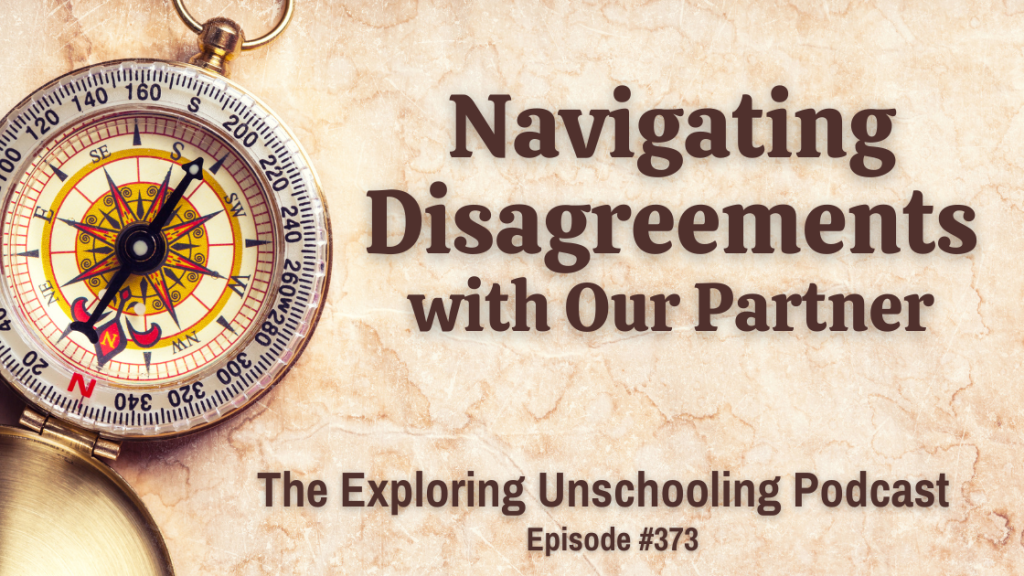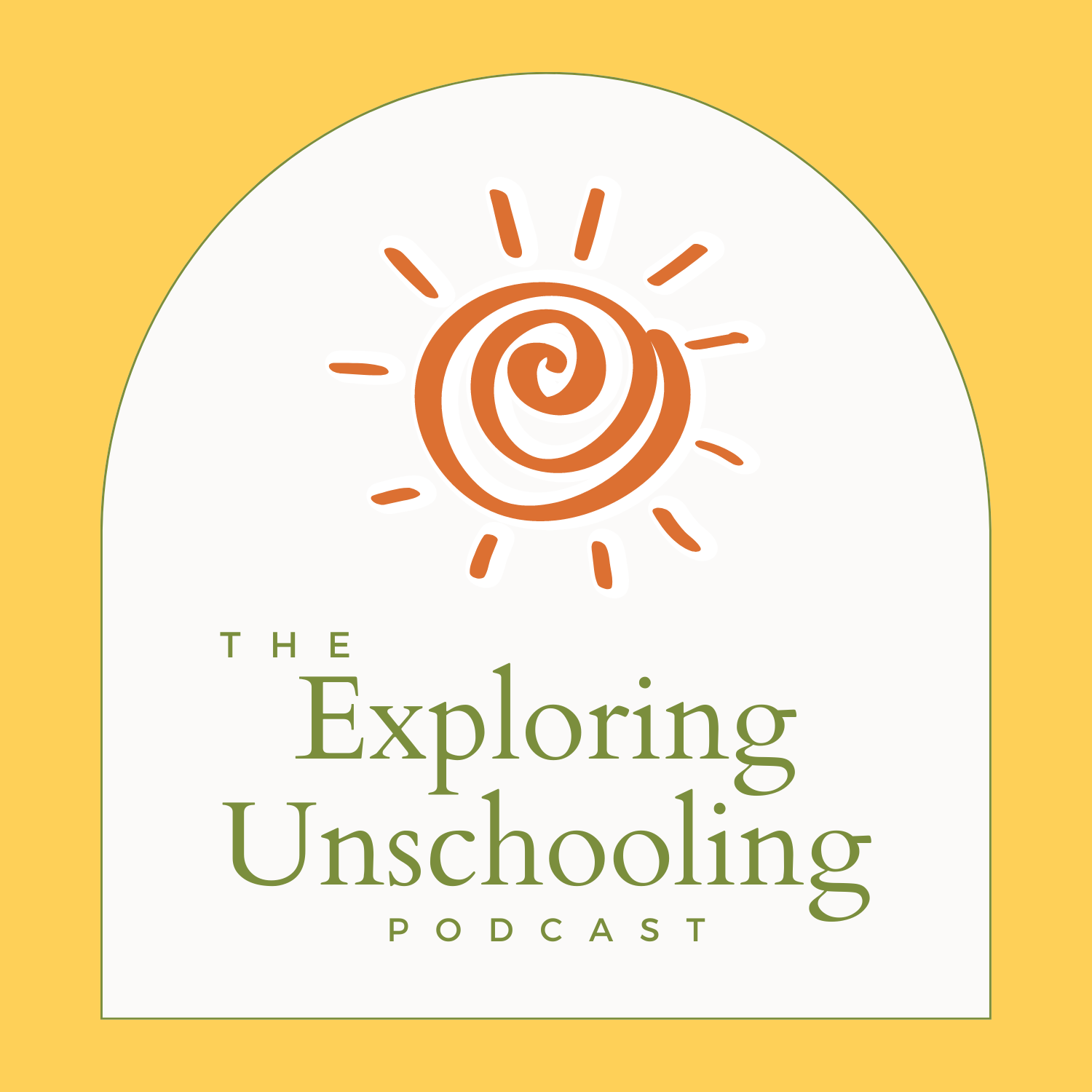EU373: Navigating Disagreements with Our Partner
Description
 </figure>
</figure>In this episode, Pam, Anna, and Erika talk about navigating disagreements with our partner. No matter how harmonious your relationship, disagreements will inevitably come up between two people. We share some tools that can help us navigate disagreements and give a few examples from our own lives where these have come into play.
We hope you find our conversation helpful on your unschooling journey and in your relationships!
THINGS WE MENTION IN THIS EPISODE
The Living Joyfully Shop – books, courses, including Four Pillars of Unschooling and Navigating Conflict, coaching calls, and more!
Watch the video of our conversation on YouTube.
Follow @exploringunschooling on Instagram.
Follow @pamlaricchia on Instagram and Facebook.
Check out our website, livingjoyfully.ca for more information about navigating relationships and exploring unschooling.
Sign up to our mailing list to receive The Living Joyfully Dispatch, our biweekly email newsletter, and get a free copy of Pam’s intro to unschooling ebook, What is Unschooling?
We invite you to join us in The Living Joyfully Network, a wonderful online community for parents to connect and engage in candid conversations about living and learning through the lens of unschooling. This month, we’re talking about seasons—in unschooling and in life. Come and be part of the conversation!
So much of what we talk about on this podcast and in the Living Joyfully Network isn’t actually about unschooling. It’s about life. On The Living Joyfully Podcast, Anna Brown and Pam Laricchia talk about life, relationships, and parenting. You can check out the archive here, or find it in your your favorite podcast player.
EPISODE TRANSCRIPT
PAM: Hello, I am Pam Laricchia from Living Joyfully, and today I’m joined by my co-hosts, Anna Brown and Erika Ellis. Welcome to you both!
Today we are going to talk about navigating disagreements with our partner because that’s something that happens. We’re different people after all. But before we dive in, we would like to invite you to join us in the Living Joyfully Network.
There is so much value in doing that deep personal work that the Unschooling journey asks of us in community because while everyone’s journey is definitely unique, we all face similar obstacles and challenges, and I think that’s where the power of community shines because you are no longer alone. You are part of a group of like-minded individuals who are on a similar journey, who acknowledge and encourage you.
As you walk alongside each other you can learn from their experiences, draw inspiration from their aha moments, gain insights from the unique and creative ways they navigate their family’s day-to-day needs and disagreements with their partner. It’s not just about getting answers to your questions. It’s about exchanging ideas, broadening perspectives, and just feeling part of something bigger.
One of our members, Carolyn shared, “The Living Joyfully Network is truly a global community of strangers who become friends, a group of people who are living intentionally, hearing each other, holding space for one another, supporting one another, lifting each other up and inspiring one another.”
And, I just got goosebumps again because that’s how I feel when I step into the Network every day.
So to learn more and join us, just follow the link in the show notes or go to livingjoyfullyshop.com and click on community in the menu.
And now Anna, would you like to get us started?
ANNA: I would! I feel like learning how to navigate disagreements is so important for any relationship because there are going to be times when we don’t see eye to eye and finding ways to express our needs and to really hear the other person is critical to finding mutually agreeable solutions and just living joyfully together.
Not surprisingly, I’m going to start with understanding that people are different. We really see the world differently. We prioritize different things. We have different histories and triggers that show up in different places in our lives.
And so when we start there, I think it allows us to not bring defensiveness into the equation when there’s a disagreement. We can be curious like, okay, wow, they’re seeing this really differently than I am, what’s going on? I want to understand, versus they’re seeing this differently, there’s something wrong with me, I’ve done something wrong. This is when we’re making it about us. And so I think that really understanding differences and getting excited and curious about it is a big, big important first step in this idea of navigating these disagreements.
Remember, this is somebody that you love. This is a partner, someone you’ve chosen to spend your life with. And I mean, I want to understand my partner. I want him to feel seen and heard, and you both want to feel comfortable with the decisions you’re making as a family because that just feels better.
It just feels better when you can get to that place of understanding each other. And the tools that we talk about so often come into play. Honestly, I’m not even sure if we can cover them all, so maybe we’ll just pick a few really important ones. The first one that really comes to mind for me when we have a disagreement is validation.
Because that’s our chance to really hear and to validate what your partner is telling you. And remember, you do not have to agree with somebody to validate their experience and you don’t have to change your mind to find a solution. Because I think that’s where we dig in. Thinking, I’ve been researching unschooling for years and they don’t know anything and I’m just going to dig my heels in.
But we’re missing that nuance of what’s happening for that other person. When we get defensive about it, when we dig our heels in. We don’t have to change our mind to really hear. This is feeling hard for you. This isn’t making sense for you. You’re feeling worried or nervous about this.
Validation helps move from that surface level statement to what the underlying needs are, and what I found is that, so often in that space of underlying needs, there’s common ground. We love our kids, we want our kids to feel good and to have a good life. We can find that common ground.
And from there then we’re able to move towards, okay, and how do we get to that? How do we navigate all of those pieces? Remembering that their concerns are a reflection of what’s happening for them. It’s not a commentary or a criticism of you. I think that’s important because it may be reflecting a little bit of disconnection.
Maybe your partner happens to work outside of the home and maybe doesn’t have the connection that you have, and so those concerns are a reflection of that. It’s not a commentary about you, it really is just. Oh wow. They don’t see these pieces. I want them to feel safe and comfortable, you know?
And so I think just that little bit of shifting your mindset around it and moving to that place of listening and validating really can help the energy of those conversations come down and it becomes this collaboration.
ERIKA: Yeah, the defensiveness is the enemy of validation.
That’s the thing that just makes it so hard in that moment. So, noticing that defensiveness in myself as a red flag, this is something where something is triggering me with what they’re saying. How can I move through that so that I can validate?
What people bump up against with validation is ideas like, but I know that this is better. I have to try to convince the other person. I have to try to convince my partner because otherwise, it’s all going to go off the rails. I know that this is important and I need to convince, and so, let me convince. I just need to figure out the right thing to say, to convince and defend my way and convince them.
It’s just the opposite of validating. But we need to remember that validation isn’t changing our mind. It’s not giving up. It’s not like now everything’s going to be just how they want it to be. It really is just about lowering the intensi





